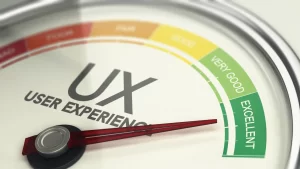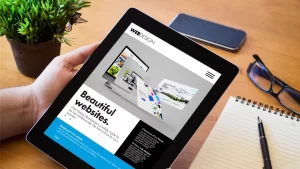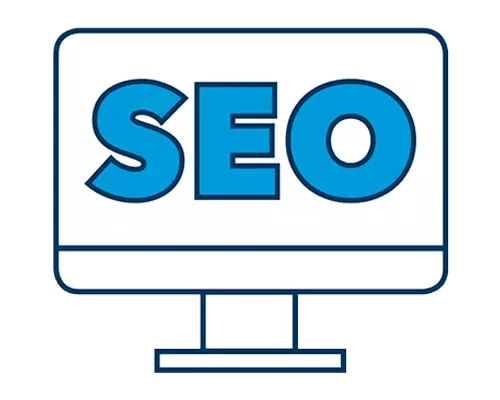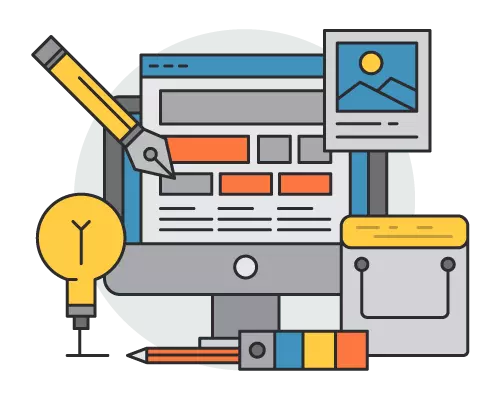Modern Website Design Services, Get Started Today
- Professional
- ROI Focused
- Transparent
- Effective

Need a Professional Look for Your Business?
Your Dream Website is Just a Click Away! Contact Us for a Free Consultation.
Our Website Design Process
Our expert web design team follows a bespoke process from start to finish, providing you with unique website designs tailored to your specific requirements.
Discovery
We start with a detailed consultation to understand your business objectives, target audience, and design preferences.
Wireframing
We create wireframes to map out the structure and user flow of your website, focusing on a seamless user experience.
Design
Our designers craft visually appealing designs from scratch, ensuring they align with your brand identity and vision.
Development
Our developers bring the design to life, using the latest technologies to build a responsive and user-friendly website.
Content Integration
We integrate and optimize your content for SEO, ensuring it effectively communicates your message and engages your audience.
Testing & Launch
Thorough testing is conducted to ensure flawless functionality. Once approved, we launch your website and provide any necessary training.
SEO Services & Website Design
Modern Website Design: Trends and Best Practices for 2024
Modern website design refers to creating websites that prioritize user experience, aesthetics, and performance using the latest technologies and design trends.
These websites feature minimalist layouts, responsive designs, fast load times, and engaging user interfaces, all aimed at improving visitor interaction and satisfaction.
Key Features of Modern Website Design
A modern website goes beyond looking sleek and stylish—it’s built with the user in mind, offering intuitive navigation, high performance, and accessibility. Let’s explore the key features that define a modern website in 2024:
1. Minimalist Layout and Design
One of the core principles of modern web design is minimalism. A minimalist website design focuses on simplicity, reducing clutter, and highlighting essential information. This approach not only makes websites visually appealing but also improves navigation by eliminating distractions.
- Why it matters: Clean, simple designs improve user experience by making it easier for visitors to find the information they’re looking for without distractions.
2. Mobile-First and Responsive Design
With more than half of global internet traffic coming from mobile devices, it’s essential for modern websites to adopt a mobile-first approach. A responsive design ensures that your website looks and functions perfectly on all devices, from smartphones to desktops.
- Why it matters: Google prioritizes mobile-friendly websites in its rankings, making responsive design crucial for SEO and user satisfaction.
3. Fast Load Times
In the digital age, speed is everything. Websites that take too long to load can lose visitors in seconds. Fast loading times are a hallmark of modern website design, as they improve user experience and are a key factor in search engine rankings.
- Why it matters: Slow websites increase bounce rates and reduce engagement, while fast websites improve conversions and customer satisfaction.
4. Engaging and Interactive Elements
Modern websites incorporate interactive elements like animations, hover effects, and engaging call-to-action buttons. These features not only make the website visually interesting but also guide users toward taking desired actions, such as filling out forms or making a purchase.
- Why it matters: Interactive elements keep users engaged and improve the overall user experience, leading to higher conversions.
5. User Experience (UX) Focused Design
User experience (UX) is at the core of modern website design. Websites are built to be intuitive and user-friendly, with clear navigation, accessible content, and easy-to-use interfaces. A focus on UX ensures that visitors can find what they need quickly and with minimal effort.
- Why it matters: A well-designed UX reduces bounce rates, increases the time users spend on the site, and boosts overall engagement.
6. Bold Typography and Visuals
Modern websites often feature bold typography and striking visuals to create a memorable impact. Typography is used not only to communicate information but also to make a design statement, while high-quality images and videos engage visitors visually.
- Why it matters: Strong visuals and typography make your website stand out, helping to establish your brand identity and capture attention.
Benefits of Modern Website Design
Investing in modern website design offers several benefits that go beyond aesthetics. Here are some key advantages:
1. Improved SEO and Higher Search Rankings
A modern website that loads quickly, is mobile-friendly, and offers an engaging user experience will perform better in search engine rankings. Google favors websites that prioritize SEO best practices, leading to more organic traffic and better visibility.
2. Enhanced User Engagement
When users find a website easy to navigate and visually appealing, they’re more likely to stay longer and engage with the content. Interactive elements, smooth transitions, and a clear call to action (CTA) keep users engaged and guide them toward conversions.
3. Increased Conversion Rates
Modern websites are designed with conversion optimization in mind. Whether you want users to make a purchase, fill out a form, or sign up for a newsletter, modern design techniques ensure that your website is optimized for user actions.
4. Future-Proofing Your Website
Keeping up with the latest web design trends and technologies ensures that your website remains relevant and competitive. A modern design future-proofs your website by making it easier to update and adapt to new technologies and user expectations.
Best Practices for Modern Website Design in 2024
To ensure your website remains competitive and effective in 2024, follow these best practices for modern web design:
1. Use White Space Effectively
White space, or empty space between elements, is a key design trend in modern websites. It helps declutter the page, improves readability, and draws attention to key elements like CTAs or product features.
2. Prioritize Mobile-First Design
Start the design process with mobile devices in mind. A mobile-first approach ensures that your website is optimized for small screens, which is crucial as more users access the web from smartphones than ever before.
3. Integrate High-Quality Visuals
Use high-resolution images, videos, and graphics that represent your brand and engage users. Visual storytelling can make your website more memorable and help users connect with your brand.
4. Focus on Speed and Performance
Optimize images, use efficient coding practices, and leverage caching to ensure that your website loads quickly. Speed is not only important for user experience but also for search engine rankings.
5. Incorporate Scrolling Animations
Subtle scrolling animations can add an element of interactivity without overwhelming the user. These animations can guide users through your content and create a more immersive browsing experience.
Case Studies: Modern Website Design in Action
Case Study 1: A Fashion Brand Website
A local fashion brand wanted to revamp its outdated website to reflect its modern, minimalist style. Symaxx Digital created a modern website with bold typography, high-quality product images, and interactive elements like hover effects and smooth transitions.
- Cost: R20,000
- Results: The brand saw a 35% increase in online sales and a 25% decrease in bounce rate, as the new design encouraged users to stay and explore the site.
Case Study 2: A Professional Services Website
A legal firm in Johannesburg needed a website that reflected its professional services while incorporating modern design trends. Symaxx Digital designed a sleek, minimalist website with clear navigation, responsive design, and fast loading times.
- Cost: R18,000
- Results: The legal firm experienced a 50% increase in inquiries, with clients praising the ease of navigation and professionalism of the website.
How to Choose the Right Modern Website Design Service
If you’re looking to create or update your website with the latest design trends, here’s how to choose the right design service:
1. Look for Expertise in Modern Design
Choose a company that specializes in modern design techniques. Check their portfolio to ensure they’re experienced with minimalist designs, responsive layouts, and interactive features.
2. Focus on User Experience
Ensure the design service prioritizes user experience (UX), as this is key to keeping users engaged and driving conversions.
3. Consider Long-Term Maintenance
Web design is not a one-time project. Choose a service that offers long-term maintenance to ensure your website stays up-to-date with design trends and performance optimizations.
Get a Free Quote for Modern Website Design Services
At Symaxx Digital, we specialize in creating modern website designs that are not only visually stunning but also optimized for performance, user experience, and SEO. Whether you need a minimalist portfolio or a high-performing e-commerce platform, we can help bring your vision to life.
Contact us today for a free consultation and quote. Call us at +27 68 580 6084 or fill out our website design request form to get started.
FAQs - Website Design
1. What is modern website design?
Modern website design refers to clean, responsive, and user-friendly websites that incorporate the latest trends and technologies for a better user experience.
2. How much does modern website design cost?
Modern website design typically costs between R10,000 and R30,000, depending on the complexity and features of the website.
3. What are the key features of modern website design?
Key features include minimalistic layouts, mobile-first design, fast load times, interactive elements, and a focus on user experience (UX).
4. Can my existing website be updated to a modern design?
Yes, existing websites can be redesigned to incorporate modern elements like mobile responsiveness, improved UX, and faster loading times.
5. How long does it take to build a modern website?
A modern website can take 4-8 weeks to design and develop, depending on the features and level of customization required.
What Our Clients Say
Trustindex verifies that the original source of the review is Google. GoodTrustindex verifies that the original source of the review is Google. Is a lovely place , affordable and cool place . have great service, prompt responses and they always ensure that as a customer,we taken careTrustindex verifies that the original source of the review is Google. The most award winning digital Agency I know is the best no scamsTrustindex verifies that the original source of the review is Google. People are well taken care ofTrustindex verifies that the original source of the review is Google. I am in awe of the service they provide. I was at wits end with unreliable digital companies. But Symaxx digital showed me how much passion they have for what they do. We were on the brink of giving up. But Symaxx insured positive results and within 1 week it was evident. Thank you so much from the bottom of our hearts for all your help. We still don't know when they sleep, as it seems like they work 24/7, but they assured me they do sleep😁Trustindex verifies that the original source of the review is Google. Symaxx Digital or should we say leaders in Website Design & Maintenance, SOE Services and Digital Marketing Agency with unique bespoke development that caters for all types of vertical clientele. @Synergy Evolution we were amazed by their professionalism, dedication and knowledge and would recommend them to anyone who appreciate high quality bespoke services. Synergy Evolution has a partner for Many Years To Come. 🥇Awards are well deserved and more will come. 🥂🤘🏼Trustindex verifies that the original source of the review is Google. GoodTrustindex verifies that the original source of the review is Google. It Works - we had tried SEO services before with another provider and we where not happy with the results. We decided to give it another go with Symaxx Digital in Pretoria and we couldn't be happier because we stared getting more calls in just under a month. I recommend Symaxx Digital SEO services and website design to anyone because they are value-packed and they work all the time.Trustindex verifies that the original source of the review is Google. I had to submit some documents to CIPC and as part of the process was a need for a website. I'm not sure how these guys work but they delivered a great looking website design in 24 hours. The price isquite competitive but worth it.Load more













